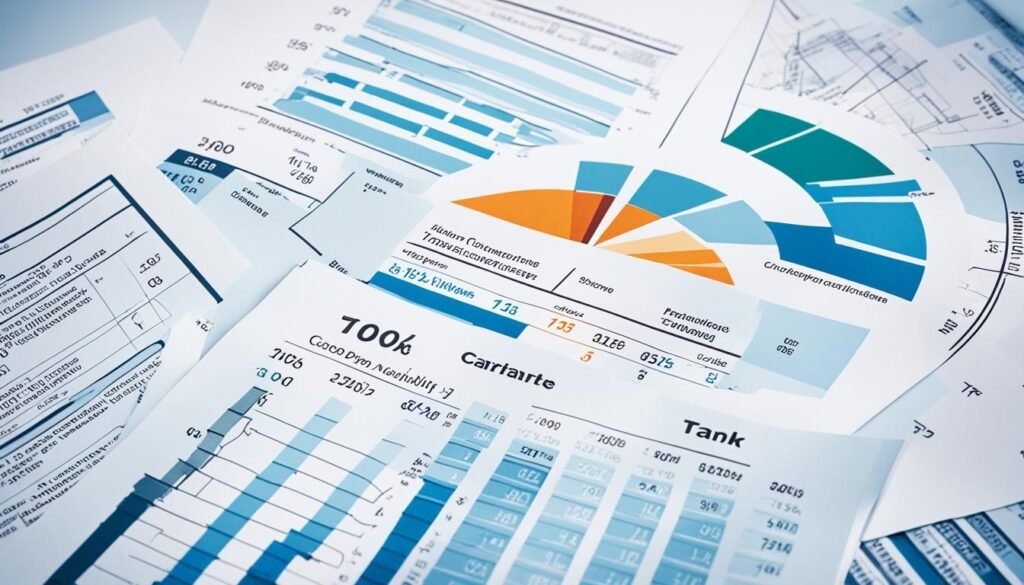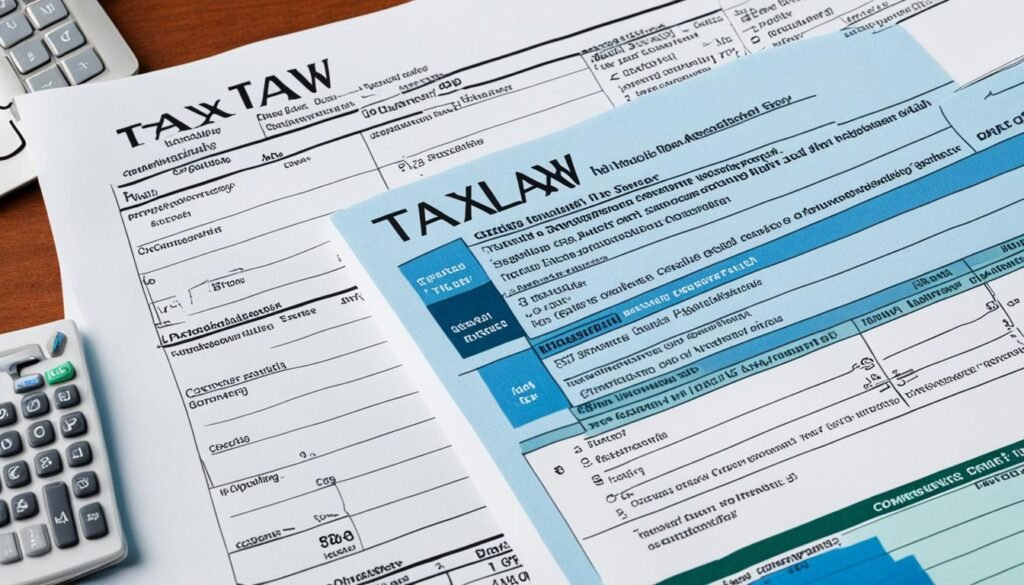The US tax system follows key principles for fairness, efficiency, and flexibility. These ideas come from Adam Smith, an 18th-century economist. They help shape and change the tax system. The main principles are about neutrality, efficiency, certainty, fairness, and flexibility.
Also Read: What Are The Key Principles Of Environmental Law?
Key Takeaways
- The US tax system is guided by five main principles: neutrality, efficiency, certainty and simplicity, effectiveness and fairness, and flexibility.
- These principles ensure that the tax laws are fair, cost-effective, easy to understand, enforceable, and adaptable to changing needs.
- The principles originated from the work of 18th-century economist Adam Smith, who outlined four general canons of taxation that remain relevant today.
- The principles provide a framework for developing and reforming the tax system to meet the evolving needs of the country.
- Adhering to these principles is crucial for maintaining a well-functioning and equitable tax system.
Overarching Principles of Tax Policy
The core of a good tax system is built on key principles. These principles help make sure taxes are fair, efficient, and simple. They also ensure that everyone knows what to expect from taxes.
Also Read: How Do Employment Law Affect Independent Contractors Vs Employees?
Neutrality
The idea of tax neutrality is simple: taxes shouldn’t change how people make economic choices. It means taxes treat all kinds of businesses the same. This way, the market can work well, without tax rules messing things up.
Efficiency
The goal of efficiency is to make taxes easy to follow and manage. It’s about cutting down on the time and effort people spend on taxes. It also means making it cheaper for tax authorities to collect taxes.
Certainty and Simplicity
Having clear and simple tax rules is key. It makes sure everyone knows what they owe in taxes. A complicated tax system can lead to confusion and tax dodging. This makes the whole tax system less effective.
These principles help shape tax systems all over the world. They’re still important in today’s digital economy, where taxes face new challenges and chances.
Also Read: How Do Surrogacy Agreements Work Under Family Law?
Equity Considerations in Tax Policy

Tax equity is key in tax policy. It makes sure taxes are fair for everyone. It looks at horizontal equity and vertical equity.
Horizontal Equity
The idea behind horizontal equity is simple. People with similar incomes or wealth should pay the same taxes. It doesn’t matter if they have different jobs or lifestyles.
Vertical Equity
Vertical equity says those who have more should pay more taxes. This idea helps reduce income gaps. It makes taxes fairer across the board.
Finding the right balance in tax policy is hard. Policymakers must think about fairness, efficiency, and what people think is right.
“Equity in taxation is not just about fairness, but also about building a stronger, more inclusive society.”
Getting tax equity right is key to a good tax system. It makes sure taxes are fair. This helps everyone in society.
Also Read: What Are The Common Legal Remedies Available In Tort Law?
Income vs Consumption Taxes
The debate over income taxes and consumption taxes is ongoing in tax policy. Most countries use both types of taxes. It’s important to know the differences to make good tax plans.
Income taxes take a cut from what people or businesses make after deductions. Consumption taxes are on what people spend on goods and services.
Who pays the tax can change. It depends on how much it costs to make things and how much people want to buy them. This is key when looking at the fairness and success of income and consumption taxes.
| Characteristic | Income Tax | Consumption Tax |
|---|---|---|
| Tax Base | Net income | Expenditures on goods and services |
| Burden Shifting | Burden depends on price elasticity of demand and supply | Burden depends on price elasticity of demand and supply |
| Timing of Tax Payment | Annual or periodic | At the time of consumption |
| Taxation of Savings | Taxed | Not taxed |
Choosing between income and consumption taxes depends on a country’s economic and social goals. Policymakers must think about the pros and cons of each to make a fair and effective tax system.
Also Read: What Impact Does Judicial Activism Have On Legal Interpretation?
Corporate Income Tax

The corporate income tax (CIT) is key in the tax world. It covers a wide range of income from corporations. This makes sure a lot of business activity is taxed.
CIT also acts as a way to pay personal income tax early. By taxing corporate profits first, it stops personal income tax from being delayed for shareholders. This keeps the tax system fair and everyone pays their share.
Broad Tax Base
The corporate income tax covers many types of income from corporations. This includes:
- Revenue from selling goods and services
- Investment income, like interest, dividends, and capital gains
- Rental income
- Royalties
- Other business-related income
Prepayment of Personal Income Tax
The corporate income tax was made to pay personal income tax early for shareholders. By taxing corporate profits first, it stops personal income tax from being delayed. This way, taxes are collected fairly and on time, following tax policy.
“The corporate income tax serves as a crucial component of the overall tax system, with its broad tax base and role as a prepayment mechanism for personal income tax.”
Tax Law Principles in Practice

The key principles of tax policy include neutrality, efficiency, certainty, simplicity, effectiveness, fairness, and flexibility. These principles help shape tax laws. They guide policymakers in making the tax system fair and efficient. This helps the government get the revenue it needs while keeping the economy strong and fair.
The neutrality principle means the tax law shouldn’t affect economic choices. It lets people and businesses decide based on the market, not taxes. The efficiency principle aims to reduce the harm caused by taxes. It makes sure the tax system doesn’t slow down economic growth too much.
Certainty and simplicity are important too. They mean the tax law should be clear and easy to understand. This lowers the costs of following the law and builds trust with taxpayers. Policymakers also look at how well the tax policy works to meet its goals. They make sure it’s fair, so everyone pays their fair share.
The flexibility principle lets the tax law change with the times. This way, policymakers can tackle new challenges and seize new chances.
“The principles of tax policy serve as a guiding framework for developing and implementing effective and equitable tax laws.”
By following these key tax law principles, policymakers can make a tax system that’s fair, efficient, and supports the economy and society.
Enforceability and Practical Considerations

For policymakers, making sure tax rules work well is key. Tax enforcement, tax administration, and tax compliance are key to getting taxes right. It’s important for the tax system to be strong and effective.
When making tax laws, it’s important to keep them simple and clear. Complex rules can lead to loopholes and ways to avoid taxes. By keeping things simple, the government can make sure more people follow the rules.
The tax authority is also crucial in making sure laws are followed. A strong and well-equipped tax administration can watch for non-compliance, catch those who don’t pay, and give the right penalties. Using new technology and skilled people helps the tax authority do its job better.
At the end, making tax laws work well is key to a fair and efficient tax system. By focusing on simplicity, openness, and strong tax administration, policymakers can encourage people to follow the rules willingly. This keeps the tax system honest.
“Effective tax enforcement is the bedrock of a well-functioning tax system.”
Tax Law

Tax law includes rules and guidance on how taxes are assessed and collected. The tax legislation, tax code, and tax law are key to a country’s tax system. They help make sure taxes are fair, efficient, and effective.
The tax legislation, tax code, and tax law set out many rules for taxing individuals and businesses. They cover how taxes are calculated, filing and paying taxes, and enforcing compliance. They also detail deductions, credits, and exemptions for taxpayers, along with penalties for not following the rules.
Knowing about tax legislation, tax code, and tax law is vital for people and businesses to understand taxes. It’s important to keep up with changes in the tax law to follow the rules and save on taxes.
“The key to understanding tax law is to remember that it is constantly evolving, and keeping up with the changes is crucial for maintaining compliance and maximizing tax benefits.”
The tax legislation, tax code, and tax law change over time to adapt to new economic conditions and policy goals. Taxpayers need to stay informed about these changes to make smart decisions and save on taxes.
| Key Components of Tax Law | Description |
|---|---|
| Statutes | The laws passed by lawmakers, like Congress or state legislatures, that set the rules for taxes. |
| Regulations | The detailed rules and guidelines from tax authorities to help apply the tax laws. |
| Administrative Guidance | Interpretive rulings and guidance from tax authorities to clarify tax laws and regulations. |
Flexibility and Adaptability

In today’s fast-changing business world, the tax system must be ready to adapt. It needs to keep up with new tech and business trends. The tax policy should be strong but also flexible. This lets governments adjust to new situations and needs.
Adapting the tax reform is key. It means the tax system can handle economic and social changes. Policymakers must check if tax laws still work well. They need to make sure they fit the current needs.
Being able to act fast when challenges arise is vital today. Tax policy adaptation should always be ongoing. It should include regular updates to deal with new things like online shopping, the sharing economy, and caring for the environment.
- Make sure the tax system stays useful and effective through tech and economic changes.
- Have a tax policy that can change with new needs and situations.
- Check and update tax laws often to keep them relevant and flexible.
| Characteristic | Importance |
|---|---|
| Flexibility | Helps the tax system adjust to new economic and social changes. This keeps it useful and effective. |
| Adaptability | Allows tax policy to quickly respond to new challenges and needs. This keeps it relevant. |
| Continuous Evaluation | Regular updates and changes to tax laws keep them useful and adaptable in a changing world. |
By being flexible and adaptable, governments can make sure their tax systems work well. They stay in line with the changing needs of people and businesses. This is key to tax reform and improving tax policy.
“A flexible and adaptable tax system is essential for governments to keep pace with the rapid changes in the modern economy.”
Inter-Nation Equity

The idea of inter-nation equity is very important in international taxation. It makes sure each country gets a fair share of taxes from cross-border deals. Countries often argue over who should get what in taxes.
Getting inter-nation equity right is hard because of the complex nature of international taxation. As more economic activities cross borders, deciding on tax revenue sharing gets tricky. Countries want to keep their tax money, leading to disagreements over source-residence taxation.
To solve these issues, experts and policymakers look at different ways to handle international taxation. They aim to make tax sharing more fair. They consider where economic activities happen, the type of transactions, and what each country contributes.
Getting inter-nation equity right is key for a fair global tax system. It makes sure each country gets its fair tax share. This helps with international cooperation, less tax conflicts, and helps the economy of countries worldwide.
“The principle of inter-nation equity is a key consideration in the global tax landscape, as it aims to ensure a fair allocation of tax revenues from cross-border activities.”
Conclusion
Tax law has key principles like neutrality, efficiency, certainty, simplicity, equity, and adaptability. These guide policymakers in making fair and effective tax policies. They help create a system that is fair, efficient, and changes with the economy and society.
Following these principles helps governments make sure the tax system does its job well. It raises money for public goods and services. The tax system is shaped by these principles to be fair, clear, and support economic growth and social well-being.
Policymakers face many challenges with tax law. But these principles are key in making policies that fit the changing needs of citizens and society. By sticking to these principles, governments can create a tax system that works well and supports a prosperous nation.
FAQs
What are the fundamental principles of tax law?
The US tax system follows five key principles. These include neutrality, efficiency, certainty, simplicity, effectiveness, fairness, and flexibility. These principles make sure tax laws are fair, cost-effective, and easy to understand. They also ensure the laws are enforceable and can change as needed.
What is the principle of tax neutrality?
Tax neutrality means taxes shouldn’t affect economic choices. It ensures all business activities are treated equally.
What is the principle of efficiency in tax policy?
Efficiency in tax policy aims to reduce costs related to compliance and administration.
What are the principles of certainty and simplicity in tax policy?
Certainty and simplicity in tax policy mean tax rules should be clear and easy to understand. They give taxpayers clear guidelines about their tax obligations.
What is horizontal equity in tax policy?
Horizontal equity means people in similar situations should pay the same amount of tax.
What is vertical equity in tax policy?
Vertical equity suggests those with more resources should pay a bigger share of taxes.
What is the difference between income taxes and consumption taxes?
Income taxes are on what you earn over a year. Consumption taxes are on what you spend on goods and services.
What is the purpose of the corporate income tax (CIT)?
The CIT was meant to be a prepayment of personal income taxes owed by shareholders. This prevented personal income tax from being delayed indefinitely.
How do the principles of tax policy guide the development and implementation of tax laws?
Tax policy principles like neutrality, efficiency, certainty, simplicity, effectiveness, fairness, and flexibility guide tax law creation and application.
Why is the enforceability of tax rules an important consideration for policymakers?
Policymakers focus on the enforceability of tax rules. This affects how well taxes can be collected and managed.
What is the role of tax law in the tax system?
Tax law includes all the rules, regulations, and guidance that govern tax assessment and collection.
Why is flexibility and adaptability important in tax systems?
Tax systems need to be flexible and adaptable to keep up with new technology and business changes.
What is the principle of inter-nation equity in tax policy?
Inter-nation equity focuses on ensuring fair sharing of national gains and losses on a global scale.
Source Links
- https://www.britannica.com/money/taxation/Principles-of-taxation
- https://www.oecd-ilibrary.org/fundamental-principles-of-taxation_5jxv8zhcggxv.pdf
- https://study.com/academy/lesson/us-tax-law-overview-basic-principles.html





